
 Residents inspect the damage to a house after an earthquake in Sorong, West Papua January 4, 2009.
Residents inspect the damage to a house after an earthquake in Sorong, West Papua January 4, 2009.REUTERS/Stringer
JAKARTA(Reuters)A series of powerful earthquakes off the northern coast of West Papua, Indonesia, early on Sunday killed four people, injured several others and flattened buildings, officials and local television said.The U.S. Geological Survey (USGS) said a magnitude 7.6 quake occurred some 150 km (95 miles) northeast of Manokwari in the Indonesian half of the island of New Guinea, at a depth of 35 km (21.7 miles). An official at Indonesia's meteorology agency said there were several quakes in the area during the night."Hotel Mutiara and tens of houses are flattened to the ground," Pitsau Amafnini, an eyewitness, told Reuters.However, an important BP-led liquefied natural gas (LNG) project close to the area was not affected, a BP spokesman told Reuters.Local media reported that the health, social, public works and transport ministers flew to the affected area, to take medicine, food, tents and cash for victims, and to inspect the local airport following a report that it had been damaged.Manokwari, with a population of about 161,000, is in a remote, sparsely-populated part of Papua which attracts tourists thanks to its diving sites, wildlife including birds of paradise, and spectacular scenery.Predominantly Christian Papua, which occupies the western half of New Guinea island, has fewer than 3 million inhabitants out of Indonesia's total population of 226 million.Several different tribes, some animist, live in this part of Indonesia, which was under Dutch rule until 1963 and which, despite its vast natural resources, tropical forests, and mineral wealth, remains one of the poorest and least developed parts of the country.The quake triggered a small tsunami that hit the Japanese coast but there was no damage, Japan's Meteorological Agency said. The Indonesian authorities also issued a tsunami warning for Papua, but lifted it shortly afterwards.
"RING OF FIRE"
Indonesia is located in an area of intense seismic activity known as the "Pacific Ring of Fire" and frequently experiences quakes and tsunami warnings.A 9.15 magnitude earthquake on December 26, 2004 triggered a massive tsunami, killing about 230,000 people in Indonesia, Thailand, Sri Lanka and other countries around the Indian ocean.Priyadi Kardono, spokesman for the disaster management center, said that the health ministry had confirmed four deaths from the quakes, while several buildings were damaged. Metro TV reported that six people had been hospitalized."Two hotels collapsed, Mutiara Hotel and Kali Dingin Hotel. Two bank buildings, a storage of (national logistics agency) Bulog, and the official house of the head of the regency were also damaged," Kardono said."There were no casualties from Kali Dingin Hotel and three trapped victims inside the Mutiara Hotel have been rescued," he said, adding that about a thousand people had gathered at certain locations in the town seeking shelter.The BP-led Tangguh LNG project is near the area affected by the quakes."There is no significant impact, only a crack in the office building. The work continues," BP spokesman Nico Kanter said, adding that employees at the Tangguh operations had felt the tremblors.BP's Tangguh project includes an operating site in Bintuni Bay, which is about 100 km south of Manokwari, as well as offices in Babo, Sorong, Manokwari, Bintuni and Fak Fak, according to its website.A spokesman for Australian disaster relief agency Emergency Management Australia told Reuters that the quakes were felt in Papua New Guinea, and in the northern Australian city of Darwin, but there were as yet no reports of major damage or injuries.PNG generally calls on Australia for help when major natural disasters occur."It was certainly felt but as far as we understand there is no report of damage or injury or people hurt. That is our information so far," the spokesman said.
(Additional reporting by Muklis Ali in Jakarta, John Package in Nabire, and Chris McCall in Sydney; Writing by Sara Webb; Editing by Sanjeev Miglani and Alex Richardson)
By Telly Nathalia and Andreas Ismar
"RING OF FIRE"
Indonesia is located in an area of intense seismic activity known as the "Pacific Ring of Fire" and frequently experiences quakes and tsunami warnings.A 9.15 magnitude earthquake on December 26, 2004 triggered a massive tsunami, killing about 230,000 people in Indonesia, Thailand, Sri Lanka and other countries around the Indian ocean.Priyadi Kardono, spokesman for the disaster management center, said that the health ministry had confirmed four deaths from the quakes, while several buildings were damaged. Metro TV reported that six people had been hospitalized."Two hotels collapsed, Mutiara Hotel and Kali Dingin Hotel. Two bank buildings, a storage of (national logistics agency) Bulog, and the official house of the head of the regency were also damaged," Kardono said."There were no casualties from Kali Dingin Hotel and three trapped victims inside the Mutiara Hotel have been rescued," he said, adding that about a thousand people had gathered at certain locations in the town seeking shelter.The BP-led Tangguh LNG project is near the area affected by the quakes."There is no significant impact, only a crack in the office building. The work continues," BP spokesman Nico Kanter said, adding that employees at the Tangguh operations had felt the tremblors.BP's Tangguh project includes an operating site in Bintuni Bay, which is about 100 km south of Manokwari, as well as offices in Babo, Sorong, Manokwari, Bintuni and Fak Fak, according to its website.A spokesman for Australian disaster relief agency Emergency Management Australia told Reuters that the quakes were felt in Papua New Guinea, and in the northern Australian city of Darwin, but there were as yet no reports of major damage or injuries.PNG generally calls on Australia for help when major natural disasters occur."It was certainly felt but as far as we understand there is no report of damage or injury or people hurt. That is our information so far," the spokesman said.
(Additional reporting by Muklis Ali in Jakarta, John Package in Nabire, and Chris McCall in Sydney; Writing by Sara Webb; Editing by Sanjeev Miglani and Alex Richardson)
By Telly Nathalia and Andreas Ismar
As in the days of Noah...

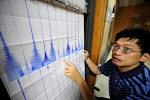

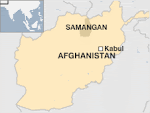







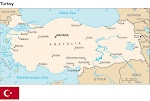
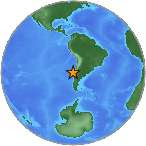




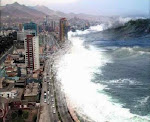

.jpg)


.bmp)
No comments:
Post a Comment